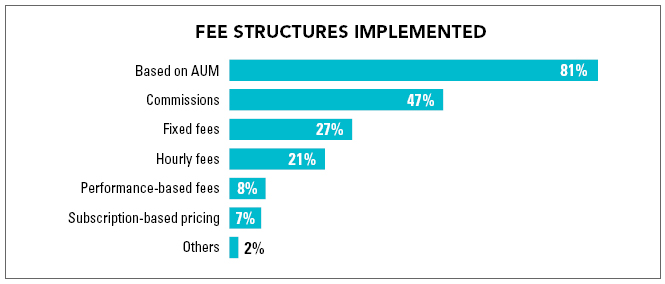

Maybe fee structures are not changing as quickly as some poeople think they are, according to new findings from InvestmentNews’ recent Outlook 2024 survey.
The survey revealed several interesting trends among financial advisors and industry professionals alike. Notably, how advisors are implementing fee structures.
Of 143 respondents, almost half of industry advisors (47 percent) still implement a commission-based structures. Meanwhile, a majority continue to be AUM based (81 percent).
Chuck Failla, CEO of Sovereign Financial, believes there could be three reasons why advisors are still focused on commission. One reason is simply ease.
“It's sometimes easier just to drop a ticket that has a commission, because whenever there's a fee involved, there's got to be a fee agreement. Do they want to sign a fee agreement every time they do something? Maybe, maybe not.”
Secondly, he outlines there could be a lack of good commission-free alternatives - While this is becoming less of an issue, there are still some financial products that don't have viable commission-free options.
The final reason, he highlights, but “is skeptical” about is “the good old-fashioned PINO (Planners In Name Only) story.” That is, a desire to keep compensation opaque, as he highlights, some advisors may want to keep their compensation hidden from clients by using commissions instead of transparent fee agreements.
“Even most commission-based advisors are good, solid people that are looking to do the right thing with their clients,” Failla says. “But there are definitely some that are just looking to do it because they're trying to keep their compensation opaque.”
Meanwhile, Amanda Muse, director of advisory at Bogart Wealth, suggests many firms, especially those that have been around for a longer period, have revenue streams from commission-based products.
“Even if you're not doing as much product sales, if you will, at this point, there are some streams of revenue that you have to give up if you go fee only,” she says.
Muse also acknowledges that not all products are inherently bad just because they are commission-based.
“There are products that have a place and that do serve client needs,” she added. “We need advisors or firms that provide those products.”

This is a topic that’s often talked about in the industry, says Adrian Johnstone, CEO of Practifi, but one “that most clients don’t actually care about,” he said in an email.
“What they’re focused on is the value they perceive they receive for the cost they pay. Whether that comes from a commission, flat fee or basis point model isn’t really a concern for most. The biggest part of the pricing conversation should be trust and transparency, not billing structure.”
Charles (Chuck) Rowlan, senior vice-president of business development at Advyzon, which serves 1,650 RIA firms exclusively, asserts they’re not seeing commission-based business being very popular.
“I don't want to say there's none,” he says, noting they also serve several hybrid firms and conduct fee studies.
“We don't even ask who does commission and who does not, because the numbers would be so low in regard to who still does commission-based business,” he added. “We do have these hybrid firms that still have commissionable business on the books so it's possible that maybe that's driving this feedback a little bit within the survey.”
These firms, he believes, may still have legacy annuities or A-share funds that are generating commission trails, but “are unlikely to be doing any new commission-based business.”
Rowlan also suggests that any remaining commission-based business is more likely to be found in annuities and C-share mutual funds, particularly for smaller clients.
Financial advisors, as distinguished from investment advisors, "must be able to accept commissions to serve clients' best interest as a practical matter," Barry Flagg, managing director at Triangulum Financial Partners, said in an email. "The last, largest, most-neglected and worst-performing asset for most clients' is their life insurance. Clients therefore need financial advice about their life insurance as much or more than anything else."
However, because cost of insurance charges are the highest cost in any life insurance policy, and because COIs vary by as much as 80 percent between products and providers, he added, limiting the solution set to only a few fee-only products can result in clients being charged higher costs, creating a conflict of interest for the advisor.
Respondents of the InvestmentNews Outlook survey included RIAs, independent broker-dealers, hybrid RIAs and wirehouses and regional brokerage and insurance firms.

Some in the industry say that more UBS financial advisors this year will be heading for the exits.

The Wall Street giant has blasted data middlemen as digital freeloaders, but tech firms and consumer advocates are pushing back.

Research reveals a 4% year-on-year increase in expenses that one in five Americans, including one-quarter of Gen Xers, say they have not planned for.

Raymond James also lured another ex-Edward Jones advisor in South Carolina, while LPL welcomed a mother-and-son team from Edward Jones and Thrivent.

Rising costs, low wages are making it hard for young Americans to move ahead
Orion's Tom Wilson on delivering coordinated, high-touch service in a world where returns alone no longer set you apart.
Barely a decade old, registered index-linked annuities have quickly surged in popularity, thanks to their unique blend of protection and growth potential—an appealing option for investors looking to chart a steadier course through today's choppy market waters, says Myles Lambert, Brighthouse Financial.
